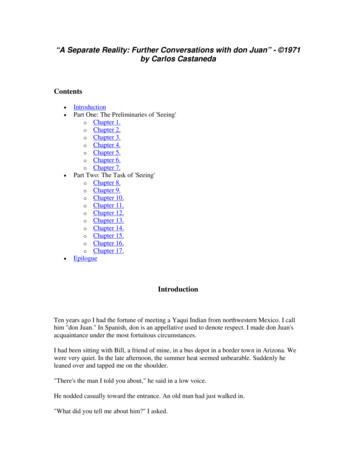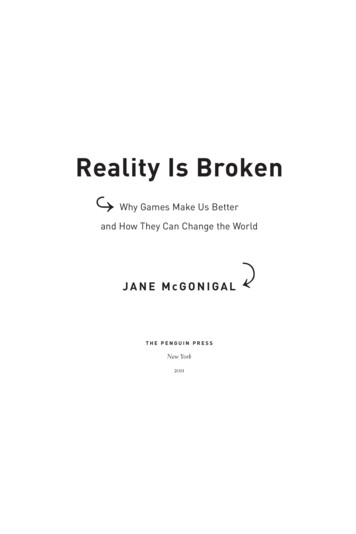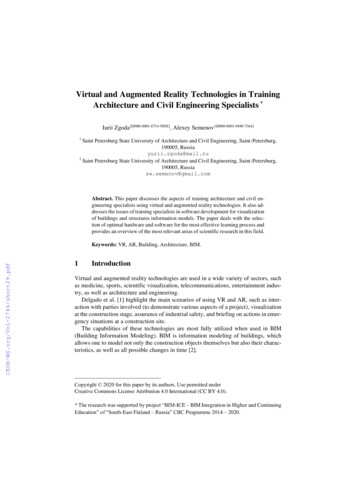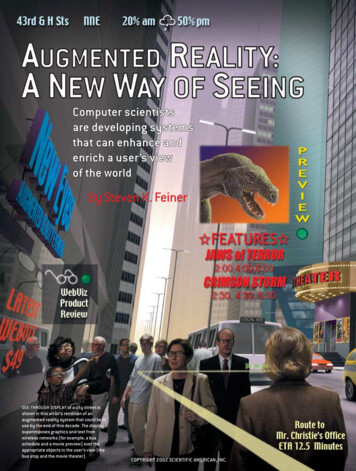
Transcription
“A Separate Reality: Further Conversations with don Juan” - 1971by Carlos CastanedaContents IntroductionPart One: The Preliminaries of 'Seeing'o Chapter 1.o Chapter 2.o Chapter 3.o Chapter 4.o Chapter 5.o Chapter 6.o Chapter 7.Part Two: The Task of 'Seeing'o Chapter 8.o Chapter 9.o Chapter 10.o Chapter 11.o Chapter 12.o Chapter 13.o Chapter 14.o Chapter 15.o Chapter 16.o Chapter 17.EpilogueIntroductionTen years ago I had the fortune of meeting a Yaqui Indian from northwestern Mexico. I callhim "don Juan." In Spanish, don is an appellative used to denote respect. I made don Juan'sacquaintance under the most fortuitous circumstances.I had been sitting with Bill, a friend of mine, in a bus depot in a border town in Arizona. Wewere very quiet. In the late afternoon, the summer heat seemed unbearable. Suddenly heleaned over and tapped me on the shoulder."There's the man I told you about," he said in a low voice.He nodded casually toward the entrance. An old man had just walked in."What did you tell me about him?" I asked.
"He's the Indian that knows about peyote. Remember?"I remembered that Bill and I had once driven all day looking for the house of an "eccentric"Mexican Indian who lived in the area. We did not find the man's house and I had the feelingthat the Indians whom we had asked for directions had deliberately misled us. Bill had toldme that the man was a "yerbero," a person who gathers and sells medicinal herbs, and that heknew a great deal about the hallucinogenic cactus, peyote. He had also said that it would beworth my while to meet him. Bill was my guide in the Southwest while I was collectinginformation and specimens of medicinal plants used by the Indians of the area.Bill got up and went to greet the man. The Indian was of medium height. His hair was whiteand short, and grew a bit over his ears, accentuating the roundness of his head.He was very dark; the deep wrinkles cm his face gave him the appearance of age, yet his bodyseemed to be strong and fit. I watched him for a moment. He moved around with a nimblenessthat I would have thought impossible for an old man.Bill signaled me to join them."He's a nice guy," Bill said to me. "But I can't understand him. His Spanish is weird, full ofrural colloquialisms, I suppose."The old man looked at Bill and smiled. And Bill, who speaks only a few words of Spanish,made up an absurd phrase in that language. He looked at me as if asking whether he wasmaking sense, but I did not know what he had had in mind; he then smiled shyly and walkedaway. The old man looked at me and began laughing. I explained to him that my friendsometimes forgot that he did not speak Spanish."I think he also forgot to introduce us," I said, and I told him my name."And I am Juan Matus, at your service," he said.We shook hands and remained quiet for some time. I broke the silence and told him about myenterprise. I told him that I was looking for any kind of information on plants, especiallypeyote. I talked compulsively for a long time, and although I was almost totally ignorant onthe subject, I said I knew a great deal about peyote. I thought that if I boasted about myknowledge he would become interested in talking to me. But he did not say anything. Helistened patiently. Then he nodded slowly and peered at me. His eyes seemed to shine with alight of their own. I avoided his gaze. I felt embarrassed. I had the certainty that at thatmoment he knew I was talking nonsense."Come to my house some time," he finally said, taking his eyes away from me. "Perhaps wecould talk there with more ease."I did not know what else to say. I felt uneasy. After a while Bill came back into the room. Herecognized my discomfort and did not say a word. We sat in tight silence for some time. Thenthe old man got up. His bus had come. He said goodbye."It didn't go too well, did it?" Bill asked.
"No.""Did you ask him about plants?""I did. But I think I goofed.""I told you, he's very eccentric. The Indians around here know him, yet they never mentionhim. And that's something.""He said I could come to his house, though.""He was bullshitting you. Sure, you can go to his house, but what does it mean? He'll nevertell you anything. If you ever ask him anything he'll clam up as if you were an idiot talkingnonsense."Bill said convincingly that he had encountered people like him before, people who gave theimpression of knowing a great deal. In his judgment, he said, such people were not worth thetrouble, because sooner or later one could obtain the same information from someone elsewho did not play hard to get. He said that he had neither patience nor time for old fogies, andthat it was possible that the old man was only presenting himself as being knowledgeableabout herbs, when in reality he knew as little as the next man.Bill went on talking but I was not listening. My mind kept on wondering about the old Indian.He knew I had been bluffing. I remembered his eyes. They had actually shone.I went back to see him a couple of months later, not so much as a student of anthropologyinterested in medicinal plants but as a person with an inexplicable curiosity. The way he hadlooked at me was an unprecedented event in my life. I wanted to know what was involved inthat look, it became almost an obsession with me. I pondered it and the more I thought aboutit the more unusual it seemed to be.Don Juan and I became friends, and for a year I paid innumerable visits. I found his mannervery reassuring I his sense of humor superb; but above all I felt there a silent consistencyabout his acts, a consistency which was thoroughly baffling to me. I felt a strange delight inhis presence and at the same time I experienced a strange discomfort. His mere companyforced me to make a tremendous reevaluation of my models of behavior.I had been reared, perhaps like everyone else, to have a readiness to accept man as anessentially weak and fallible creature. What impressed me about don Juan was the fact that hedid not make a point of being weak and helpless, and just being around him insured anunfavorable comparison between his way of behaving and mine.Perhaps one of the most impressive statements he made to me at that time was concerned withour inherent difference. Prior to one of my visits I had been feeling quite unhappy about thetotal course of my life and about a number of pressing personal conflicts that I had. When Iarrived at his house I felt moody and nervous.We were talking about my interest in knowledge; but, as usual, we were on two differenttracks. I was referring to academic knowledge that transcends experience, while he wastalking about direct knowledge of tine world.
"Do you know anything about the world around you?" he asked."I know all kinds of things," I said."I mean do you ever feel the world around you?""I feel as much of the world around me as I can.""That's not enough. You must feel everything, otherwise the world loses its sense."I voiced the classical argument that I did not have to taste the soup in order to know therecipe, nor did I have to get an electric shock in order to know about electricity."You make it sound stupid," he said. "The way I see it, you want to cling to your arguments,despite the fact that they bring nothing to you; you want to remain the same even at the cost ofyour well-being.""I don't know what you're talking about.""I am talking about the fact that you're not complete. You have no peace."That statement annoyed me. I felt offended. I thought he was certainly not qualified to passjudgment on my acts or my personality."You're plagued with problems," he said. "Why?""I am only a man, don Juan," I said peevishly.I made that statement in the same vein my father used to make it. Whenever he said he wasonly a man he implicitly meant he was weak and helpless and his statement, like mine, wasfilled with an ultimate sense of despair.Don Juan peered at me as he had done the first day we met."You think about yourself too much," he said and smiled. "And that gives you a strangefatigue that makes you shut off the world around you and cling to your arguments. Therefore,all you have is problems. I'm only a man too, but I don't mean that the way you do.""How do you mean it?""I've vanquished my problems. Too bad my life is so short that I can't grab onto all the thingsI would like to. But that is not an issue; it's only a pity."I liked the tone of his statement. There was no despair or self-pity in it.In 1961, a year after our first meeting, don Juan disclosed to me that he had a secretknowledge of medicinal plants. He told me he was a "brujo." The Spanish word brujo can berendered in English as sorcerer, medicine man, curer. From that point on the relation betweenus changed; I became his apprentice and for the next four years he endeavored to teach me the
mysteries of sorcery. I have written about that apprenticeship in The Teachings of Don Juan:A Yaqui Way of Knowledge.Our conversations were conducted in Spanish, and thanks to don Juan's superb command ofthat language I obtained detailed explanations of the intricate means of his system of beliefs. Ihave referred to that complex and well-systematized body of knowledge as sorcery havereferred to him as a sorcerer because those categories he himself used in informalconversations. the context of more serious elucidations, however, he could use the terms"knowledge" to categorize sorcery and "man of knowledge" or "one who knows" to categorizea sorcerer.In order to teach and corroborate his knowledge don Juan three well-known psychotropicplants: peyote, Lophophora williamasii; jimson weed, Datura inoxia; and a species ofmushroom which belongs to the genus Psylo-cebe. Through the separate ingestion of each ofthese hallucinogens he produced in me, as his apprentice, some peculiar states of distortedperception, or altered consciousness, which I have called "states of nonordinary reality." Ihave used the word "reality" because it was a major premise in don Juan's system of beliefsthat the states of consciousness produced by the ingestion of any of those three plants werenot hallucinations, but concrete, although unordinary, aspects of the reality of everyday life.Don Juan behaved toward these states of non-ordinary reality not "as if" they were real but"as" real.To classify these plants as hallucinogens and the states they produced as nonordinary realityis, of course, my own device. Don Juan understood and explained the plants as being vehiclesthat would conduct or lead a man to certain impersonal forces or "powers" and the states theyproduced as being the "meetings" that a sorcerer had to have with those "powers" in order togain control over them.He called peyote "Mescalito" and he explained it as being a benevolent teacher and protectorof men. Mescalito taught the "right way to live." Peyote was usually ingested at gatherings ofsorcerers called "mitotes," where the participants would gather specifically to seek a lesson onthe right way to live,Don Juan considered the jimson weed and the mushrooms to be powers of a different sort. Hecalled them "allies" and said that they were capable of being manipulated; a sorcerer, in fact,drew his strength from manipulating an ally. Of the two, don Juan preferred the mushroom.He maintained that the power contained in the mushroom was his personal ally and he calledit "smoke" or "little smoke."Don Juan's procedure to utilize the mushrooms was to let them dry into a fine powder inside asmall gourd. He kept the gourd sealed for a year and then mixed the fine powder with fiveother dry plants and produced a mixture for smoking in a pipe.In order to become a man of knowledge one had to "meet" with the ally as many times aspossible; one had to become familiar with it. This premise implied, of course, that one had tosmoke the hallucinogenic mixture quite often. The process of "smoking" consisted ofingesting the fine mushroom powder, which did not incinerate, and inhaling the smoke of theother five plants that made up the mixture. Don Juan explained the profound effects that themushrooms had on one's perceptual capacities as the "ally removing one's body."
Don Juan's method of teaching required an extraordinary effort on the part of the apprentice.In fact, the degree of participation and involvement needed was so strenuous that by the endof 1965 I had to withdraw from the apprenticeship. I can say now, with the perspective of thefive years that have elapsed, that at that time don Juan's teachings had begun to pose a seriousthreat to my "idea of the world." I had begun to lose the certainty, which all of us have, thatthe reality of everyday life is something we can take for granted.At the time of my withdrawal I was convinced that my decision was final; I did not want tosee don Juan ever again. However, in April of 1968 an early copy of my book was madeavailable to me and I felt compelled to show it to him. I paid him a visit. Our link of teacherapprentice was mysteriously reestablished, and I can say that on that occasion I began asecond cycle of apprenticeship, very different from the first. My fear was not as acute as ithad been in the past. The total mood of don Juan's teachings was more relaxed. He laughedand also made me laugh a great deal. There seemed to be a deliberate intent on his part tominimize seriousness in general. He clowned during the truly crucial moments of this secondcycle, and thus helped me to overcome experiences which could easily have becomeobsessive. His premise was that a light and amenable disposition was needed in order towithstand the impact and the strangeness of the knowledge he was teaching me."The reason you got scared and quit is because you felt too damn important," he said,explaining my previous withdrawal. "Feeling important makes one heavy, clumsy, and vain.To be a man of knowledge one needs to be light and fluid."Don Juan's particular interest in his second cycle of apprenticeship was to teach me to "see."Apparently in his system of knowledge there was the possibility of making a semanticdifference between "seeing" and "looking" as two distinct manners of perceiving. "Looking"referred to the ordinary way in which we are accustomed to perceive the world, while"seeing" entailed a very complex process by virtue of which a man of knowledge allegedlyperceives the "essence" of the things of the world.In order to present the intricacies of this learning process in a readable form I have condensedlong passages of questions and answers, and thus I have edited my original field notes. It ismy belief, however, that at this point my presentation cannot possibly detract from themeaning of don Juan's teachings. The editing was aimed at making my notes flow, asconversation flows, so they would have the impact I desired; that is to say, I wanted by meansof a reportage to communicate to the reader the drama and directness of the field situation.Each section I have set as a chapter was a session with don Juan. As a rule, he alwaysconcluded each of our sessions on an abrupt note; thus the dramatic tone of the ending of eachchapter is not a literary device of my own, it was a device proper of don Juan's oral tradition.It seemed to be a mnemonic device that helped me to retain the dramatic quality andimportance of the lessons.Certain explanations are needed, however, to make my reportage cogent, since its claritydepends on the elucidation of a number of key concepts or key units that I want to emphasize.This choice of emphasis is congruous with my interest in social science. It is perfectlypossible that another person with a different set of goals and expectations would single outconcepts entirely different from those I have chosen myself.
During the second cycle of apprenticeship don Juan made a point of assuring me that the useof the smoking mixture was the indispensable prerequisite to "seeing." Therefore I had to useit as often as possible."Only the smoke can give you the necessary speed to catch a glimpse of that fleeting world,"he said.With the aid of the psychotropic mixture, he produced in me a series of states of nonordinaryreality. The main feature of such states, in relation to what don Juan seemed to be doing, wasa condition of "inapplicability." What I perceived in those states of altered consciousness wasincomprehensible and impossible to interpret by means of our everyday mode ofunderstanding the world. In other words, the condition of inapplicability entailed the cessationof the pertinence of my world view.Don Juan used this condition of inapplicability of the states of nonordinary reality in order tointroduce a series of preconceived, new "units of meaning." Units of meaning were all thesingle elements pertinent to the knowledge don Juan was striving to teach me. I have calledthem units of meaning because they were the basic conglomerate of sensory data and theirinterpretations on which more complex meaning was constructed. One example of such a unitis the way in which the physiological effect of the psychotropic mixture was understood. Itproduced a numbness and loss of motor control that was interpreted in don Juan's system asan act performed by the smoke, which in this case was the ally, in order "to remove the bodyof the practitioner."Units of meaning were grouped together in a specific way, and each block thus createdformed what I have called a "sensible interpretation." Obviously there has to be an endlessnumber of possible sensible interpretations that are pertinent to sorcery that a sorcerer mustlearn to make. In our day-to-day life we are confronted with an endless number of sensibleinterpretations pertinent to it. A simple example could be the no longer deliberateinterpretation, which we make scores of times every day, of the structure we call "room." It isobvious that we have learned to interpret the structure we call room in terms of room; thusroom is a sensible interpretation because it requires that at the time we make it we arecognizant, in one way or another, of all the elements that enter into its composition. A systemof sensible interpretation is, in other words, the process by virtue of which a practitioner iscognizant of all the units of meaning necessary to make assumptions, deductions, predictions,etc., about all the situations pertinent to his activity.By "practitioner" I mean a participant who has an adequate knowledge of all, or nearly all, theunits of meaning involved in his particular system of sensible interpretation. Don Juan was apractitioner; that is, he was a sorcerer who knew all the steps of his sorcery.As a practitioner he attempted to make his system of sensible interpretation accessible to me.Such an accessibility, in this case, was equivalent to a process of re-socialization in whichnew ways of interpreting perceptual data were learned.I was the "stranger," the one who lacked the capacity to make intelligent and congruousinterpretations of the units of meaning proper to sorcery.Don Juan's task, as a practitioner making his system accessible to me, was to disarrange aparticular certainty which I share with everyone else, the certainty that our "common-sense"
views of the world are final. Through the use of psychotropic plants, and through welldirected contacts between the alien system and myself, he succeeded in pointing out to methat my view of the world cannot be final because it is only an interpretation.For the American Indian, perhaps for thousands of years, the vague phenomenon we callsorcery has been a serious bona fide practice, comparable to that of our science. Our difficultyin understanding it stems, no doubt, from the alien units of meaning with which it deals.Don Juan had once told me that a man of knowledge had predilections. I asked him to explainhis statement."My predilection is to see," he said."What do you mean by that?""I like to see" he said, "because only by seeing can a man of knowledge know.""What kind of things do you see?""Everything.""But I also see everything and I'm not a man of knowledge.""No. You don't see."I think I do.""I tell you, you don't.""What makes you say that, don Juan?""You only look at the surface of things.""Do you mean that every man of knowledge actually sees through everything he looks at?""No. That's not what I mean. I said that a man of knowledge has his own predilections; mineis just to see and to know; others do other things.""What other things, for example?""Take Sacateca, he's a man of knowledge and his predilection is dancing. So he dances andknows.""Is the predilection of a man of knowledge something he does in order to know?""Yes, that is correct.""But how could dancing help Sacateca to know?""One can say that Sacateca dances with all he has."
"Does he dance like I dance? I mean like dancing?""Let's say that he dances like I see and not like you may dance.""Does he also see the way you see?""Yes, but he also dances.""How does Sacateca dance?""It's hard to explain that. It is a peculiar way of dancing he does when he wants to know. Butall I can say about it is that, unless you understand the ways of a man who knows, it isimpossible to talk about dancing or seeing."Have you seen him doing his dancing?""Yes. However, it is not possible for everyone who looks at his dancing to see that it is hispeculiar way of knowing."I knew Sacateca, or at least I knew who he was. We had met and once I had bought him abeer. He was very polite and told me I should feel free to stop at his house anytime I wantedto. I toyed for a long time with the idea of visiting him but I did not tell don Juan. On theafternoon of May 14, 1962, I drove up to Sacateca's house; he had given me directions how toget there and I had no trouble finding it. It was on a corner and had a fence all around it. Thegate was closed. I walked around it to see if I could peek inside the house. It appeared to bedeserted."Don Elias," I called out loud. The chickens got frightened and scattered about cacklingfuriously. A small dog came to the fence. I expected it to bark at me; instead, it just sat therelooking at me. I called out once again and the chickens had another burst of cackling.An old woman came out of the house. I asked her to call don Elias."He's not here," she said."Where can I find him?""He's in the fields.""Where in the fields?""I don't know. Come back in the late afternoon. Hell be here around five.""Are you don Elias wife?""Yes, I'm his wife," she said and smiled.I tried to ask her about Sacateca but she excused herself and said that she did not speakSpanish well. I got into my car and drove away.
I returned to the house around six o'clock. I drove to the door and yelled Sacateca's name.This time he came out of the house. I turned on my tape recorder, which in its brown leathercase looked like a camera hanging from my shoulder. He seemed to recognize me."Oh, it's you," he said, smiling. "How's Juan?""He's fine. But how are you, don Elias?"He did not answer. He seemed to be nervous. Overtly he was very composed, but I felt that hewas ill at ease."Has Juan sent you here on some sort of errand?""No. I came here by myself.""What in the world for?"His question seemed to betray very bona fide surprise."I just wanted to talk to you," I said, hoping to sound as casual as possible. "Don Juan has toldme marvelous things about you and I got curious and wanted to ask you a few questions."Sacateca was standing in front of me. His body was lean and wiry. He was wearing khakipants and shirt. His eyes were half-closed; he seemed to be sleepy or perhaps drunk. Hismouth was open a bit and his lower lip hung. I noticed that he was breathing deeply andseemed to be almost snoring. The thought came to me that Sacateca was undoubtedlyplastered out of his mind. But that thought seemed to be very incongruous because only a fewminutes before, when he came out of his house, he had been very alert and aware of mypresence."What do you want to talk about?" he finally said.His voice was tired; it was as though his words dragged after each other. I felt very uneasy. Itwas as if his tiredness was contagious and pulling me."Nothing in particular," I answered. "I just came to chat with you in a friendly way. You onceasked me to come to your house.""Yes, I did, but it's not the same now.""Why isn't it the same?""Don't you talk with Juan?""Yes, I do.""Then what do you want with me?""I thought maybe I could ask you some questions?"
"Ask Juan. Isn't he teaching you?""He is, but just the same I would like to ask you about what he is teaching me, and have youropinion. This way I'll be able to know what to do.""Why do you want to do that? Don't you trust Juan?""I do.""Then why don't you ask him to tell you what you want to know?""I do. And he tells me. But if you could also tell me about what don Juan is teaching me,perhaps I will understand better.""Juan can tell you everything. He alone can do that. Don't you understand that?""I do, but then I'd like to talk with people like you, don Elias. One does not find a man ofknowledge every day.""Juan is a man of knowledge.""I know that.""Then why are you talking to me?""I said I came to be friends,""No, you didn't. There is something else about you this time."I wanted to explain myself and all I could do was mumble incoherently. Sacateca did not sayanything. He seemed to listen attentively. His eyes were half-closed again but I felt he waspeering at me. He nodded almost imperceptibly. Then his lids opened and I saw his eyes. Heseemed to be looking past me. He casually tapped the floor with the tip of his right foot, justbehind his left heel. His legs were slightly arched; his arms were limp against his sides. Thenhe lifted his-right arm; his hand was open with the palm turned perpendicular to the ground;his fingers were extended and pointing toward me. He let his hand wobble a couple of timesbefore he brought it to my face level. He held it in that position for an instant and then he saida few words to me. His voice was very clear, yet the words dragged.After a moment he dropped his hand to his side and remained motionless, taking a strangeposition. He was standing, resting on the ball of his left foot. His right foot was crossedbehind the heel of the left foot and he was tapping the floor rhythmically and gently with thetip of his right footI felt an unwarranted apprehension, a form of restlessness. My thoughts seemed to bedissociated. I was thinking unrelated nonsensical thoughts that had nothing to do with whatwas going on. I noticed my discomfort and tried to steer my thoughts back to the situation athand, but I couldn't in spite of a great struggle. It was as if some force was keeping me fromconcentrating or thinking relevant thoughts.
Sacateca had not said a word, and I didn't know what else to say or do. Quite automatically, Iturned around and left.Later on I felt compelled to tell don Juan about my encounter with Sacateca. Don Juan roaredwith laughter."What really took place there?" I asked."Sacateca danced!" don Juan said. "He saw you, then he danced.""What did he do to me? I felt very cold and dizzy.""He apparently didn't like you and stopped you by tossing a word at you.""How could he possibly do that?" I exclaimed incredulously."Very simple; he stopped you with his will.""What did you say?""He stopped you with his will!"The explanation did not suffice. His statements sounded like gibberish to me. I tried to probehim further, but he could not explain the event to my satisfaction.Obviously that event or any event that occurred within this alien system of sensibleinterpretation could be explained or understood only in terms of the units of meaning properto that system. This work is, therefore, a reportage and should be read as a reportage. Thesystem I recorded was incomprehensible to me, thus the pretense to anything other thanreporting about it would be misleading and impertinent. In this respect I have adopted thephenomenological method and have striven to deal with sorcery solely as phenomena thatwere presented to me. I, as the perceiver, recorded what I perceived, and at the moment ofrecording I endeavored to suspend judgment.Part One: The Preliminaries of 'Seeing'Chapter 1April 2.1968Don Juan looked at me for a moment and did not seem at all surprised to see me, even thoughit had been more than two years since I last visited him. He put his hand on my shoulder andsmiled gently and said that I looked different, that I was getting fat and soft.
I had brought him a copy of my book. Without any preliminaries I took it out of my brief caseand handed it to him."It's a book about you, don Juan," I said.He took it and flipped through the pages as if they were a deck of cards. He liked the greencolor on the dust jacket and the height of the book. He felt the cover with his palms, turned itaround a couple of times, and then handed it back to me. I felt a great surge of pride."I want you to keep it," I said.He shook his head with a silent laugh."I better not," he said, and then added with a broad "You know what we do with paper inMexico."I laughed. I thought his touch of irony was beautiful.We where sitting on a bench in the park of a small town in the mountainous area of centralMexico. I had absolutely no way of letting him know about my intention of paying him avisit, but I was certain I was going to find him, and I did. I waited only a short while in thattown before don Juan came down from the mountains and I found him at the market, at thestand of one of his friends.Don Juan told me, matter-of-factly, that I was there just in time to take him back to Sonora,and we sat in the park to wait for a friend of his, a Mazatec Indian with whom he lived.We waited about three hours. We talked about different unimportant things, and toward theend of the day, right before his friend came, I related to him some events I had witnessed afew days before.During my trip to see him my car broke down in the outskirts of a city
"A Separate Reality: Further Conversations with don Juan" - 1971 by Carlos Castaneda Contents Introduction Part One: The Preliminaries of 'Seeing' o Chapter 1. o Chapter 2. o Chapter 3. o Chapter 4. o Chapter 5. o Chapter 6. o Chapter 7. Part Two: The Task of 'Seeing' o Chapter 8. o Chapter 9. o Chapter 10. o Chapter 11. o Chapter 12. o Chapter 13. o Chapter 14.










